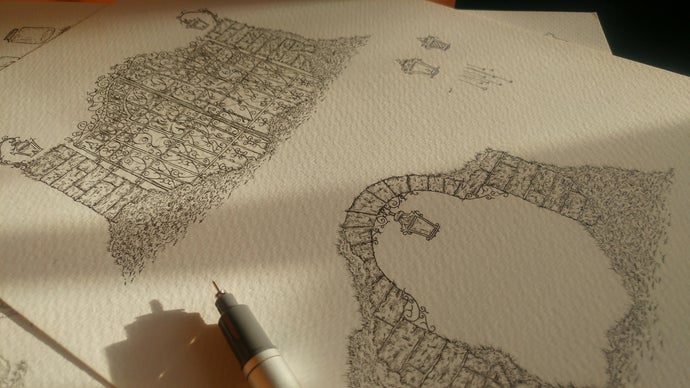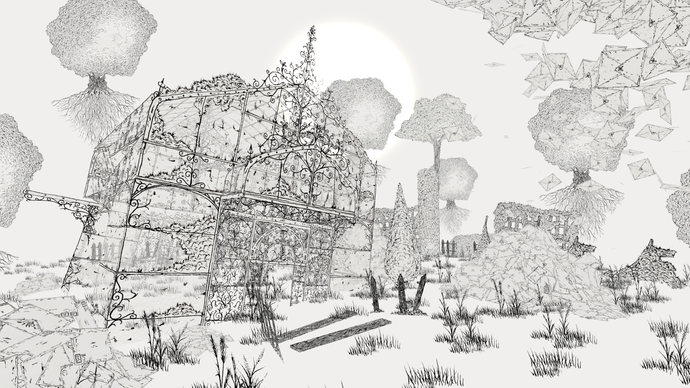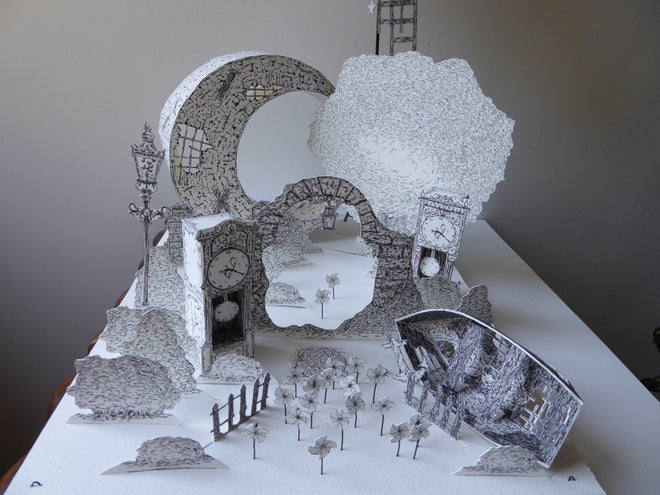Few games have left such an immediate impression on me as The Collage Atlas. Here are anchors dropping from a white sky, razor-thin keys opening butterfly locks, and books swarming in the wakes of ships as if they were murmurations of starlings. Brought to life with a hand-drawn pen-and-ink aesthetic, the game’s calm spaces and wealth of illustrative detail work together to encourage self-reflection. Having immersed myself in the game over the last few weeks, I wanted to know more. That’s why I find myself talking to its solo developer, John Evelyn. He’s the man who built this game and literally drew it into life.
It took Evelyn four and a half years to create The Collage Atlas. He tells me it began as a picture book designed to help people through difficult times – a picture book that would have worked alongside a companion app. “I initially assumed that the best way to talk about the things I want to discuss would be through a picture book,” he explains. But the medium was always secondary to the message he wished to convey.
“I wanted to explore the idea that when life becomes particularly challenging – perhaps we go through traumatic events or things completely out of our hands. We start to feel that our sense of agency is somewhat undermined.” Evelyn pauses here. “That we don’t have meaningful authorship over our own lives. That’s something that I and many other people have experienced.”
Evelyn initially created a demo scene with a pinwheel, like the ones often found at the seaside. “I decided it’d be cool to make it spin if you turned the cameras towards it,” he tells me. Everything in the game is spun out from this moment, Evelyn explains. This scene was where he realised what he was trying to say with the project. “I was trying to communicate this idea of your presence mattering, even when you no longer feel empowered. When you no longer feel that sense of agency, actual presence in the world in itself is significant.”
With agency at its core, Evelyn realised his concept would be better suited to a video game than a picture book. As a result, he became interested in bringing his art into the digital space. “It was a very organic process, as I found myself doing more illustrations,” he says. And so, The Collage Atlas was born one drawing at a time, building outwards to become an exploration game filled with secrets, in which the player brings life to the landscape, all of it delivered through Evelyn’s fine-lined, detailed art.
Evelyn has always drawn. “I found satisfaction in my own means of private expression rather than pursuing art as a career,” he tells me. Coming from a hobbyist, self-taught background, Evelyn doesn’t consider himself particularly academic and didn’t try studying any particular illustrators to nail his own style. In fact, he admits he has been, “quite naive when it comes to that kind of thing.” That said, he admires Raymond Briggs, Maurice Sendak, and Antoine de Saint-Exupéry. It’s fun to look at his work and see potential traces of these three legendary figures in the weight of a line, the particular curl of a doodled blade of grass.
Despite briefly working with another developer to assist with technical aspects like Steam cloud saves, The Collage Atlas really is predominantly a solo project. Evelyn says that, paradoxically, he found it easier to manage this way. “I actually preferred working on my own on this, having everything as unfiltered as possible.” He laughs. “Sometimes, I think the more people involved in a project can dilute the initial idea. It’s not always diluted; sometimes it’s enhanced, but I wanted that immediacy.”

I want to know how the pen-and-ink aesthetic better reflects the themes he’s trying to convey than more traditional 3D visuals would have. I guess I’m questioning what made drawing this world special to Evelyn.
“Anytime we create something, our idea is somewhat abstracted because it’s filtered through the tools we’re using,” he tells me. “I love making 3D stuff directly on the computer, but in this instance, I wanted to maintain as much of that human touch as I could – those natural imperfections, those fingerprints that we put over things. There’s a palpable sense of humanity that I really appreciate in work and I wanted to capture that. It made sense to put the pen to paper and let the ink fly.”
The ink may have flown, but there’s a deep rigour and craft at work in The Collage Atlas. Evelyn tells me his approach to drawing stayed the same during development, and he stuck rigidly to the same pens and paper, although the process evolved a little. “Originally, the whole game would have had this flat, almost pop-up picture book aesthetic with 2D objects in a 3D space,” he explains. Unfortunately, this didn’t work, and he eventually transitioned to modeling objects in 3D, hand-drawing the textures and scanning them back in. “I created a 2D lighthouse and when I looked at it in the world, it just looked really daft,” he laughs. “When you look up at something that’s that flat and it’s rotating around on this axis, it loses its luster.”

That lighthouse is a reminder that a huge part of the appeal of The Collage Atlas comes down to the fact that it’s a game of specifics. The Victorian-esque lampposts and ironwork fences evoke imagery from Evelyn’s home city, Portsmouth, while the gates were inspired by a similar set he saw outside his grandparents’ house when growing up.
This kind of stuff makes the game feel intensely personal at times, and I’ve wondered, while playing, how much of it comes down to memory. Evelyn tells me he tried making this a universal experience, but that, over time, he realized that some of his designs were subconsciously based on places he’d lived at over the years. “I think the actual world itself is the most explicitly unfiltered personal thing,” he tells me, “because it’s full of things that have sat in the back of my mind throughout my life.”
It’s little surprise, then, that exploring The Collage Atlas’ world ultimately feels like a personal journey to Evelyn. It’s a tricky balance, because Evelyn is clear that he wanted to make something “useful,” – his word – rather than a journal entry. “The very nature of the themes that I’m exploring means that they are informed by difficult experiences I’ve had. In that way, it’s personal, but the project aimed to find the universal themes at the heart of the things that affected me as best as possible.”

Evelyn tells me he struggled to find books, music, and games that spoke to him at those difficult times in his own life. He made The Collage Atlas in part because it’s the thing he wished had existed. Without going into potential spoilers here, he admits that this approach led to some “pretty on-the-nose visual metaphors,” to ensure it appealed more widely. Even still, I had to ask: bold intentions aside, what drives someone to spend over four years solo-developing a video game? What makes you get up on a morning, midway through the fourth year, and continue drawing?
For Evelyn, he’s still trying to figure that out.
“It can’t be financial reasons, because the number of hours I’ve put into this game is ridiculous,” he laughs. “I was fortunate that I was compelled. I had this idea that completely possessed me at a time in my life where I don’t have children or anyone else dependent on me. I was able to go all-in on an idea and, honestly, I couldn’t have done the amount of work I’ve done on this for someone else.”
So what’s next? Moving onto future projects, I ask Evelyn whether any shared DNA or evolving thoughts carried over from The Collage Atlas into his upcoming aerial adventure, The Wings Of Sycamore. On the surface they may seem very different – Sycamore takes place in a Victorian-inspired world where you play as a legendary pilot’s protege in the early days of aviation – but there’s a stronger connection than you might anticipate.
“In many ways, I feel like The Wings Of Sycamore is a direct sequel,” he tells me. “That might not seem obvious but thematically it is. The Collage Atlas is about your reaction to turbulence in your life and how that can cause you to take a fall, but it’s ultimately about the hope that there’s an ascent afterwards. The Wings of Sycamore is pure flight, both figuratively and literally. It’s meant to be the joyous bit after you’ve managed to pull yourself together.”
Though he doesn’t want to be seen as a one-trick pony with his delicate hand-drawn art, Evelyn still wants to speak in his natural creative voice. “I shied away from it initially, before I was like, ‘No, do you know what? I really like drawing worlds.’ I just have to do it more efficiently next time because I want to make a bigger one,” he says. As a result, the textures and worlds are still hand-drawn in Sycamore, but the technical methods of implementing them are different.
Will The Collage Atlas ever reach other platforms, I wonder? For Evelyn, it’s a case of “never say never,” but limited resources meant he chose PC after Apple Arcade to ensure the broadest reach. “I was trying to make something useful that hopefully helps people. And the only way you can help is by reaching as many people as possible. It made absolute sense that whatever happened, I had to get this on PC eventually.” Should the opportunity arise, though, he’s open to bringing it to “literally everything.”
It’s clear that The Collage Atlas isn’t an experience you’d ever find from a larger development team. Though Evelyn didn’t turn this world into an elaborate journal entry, you can clearly see where those memories and his ambition shaped its vivid and unique design. Even with that broader audience in mind, what’s here remains a rather personal journey – and one that ultimately resonated with me too.
